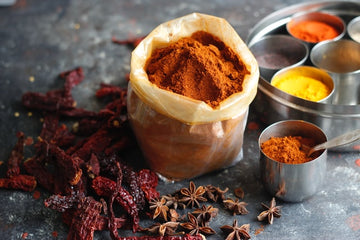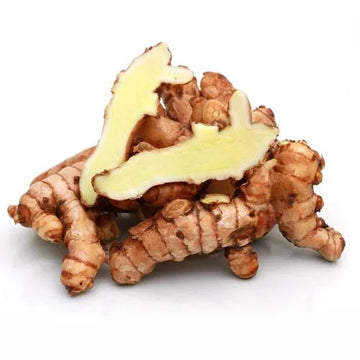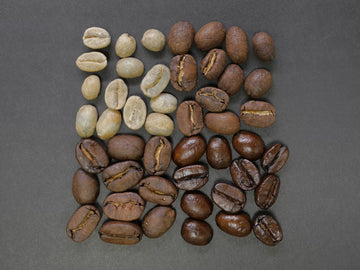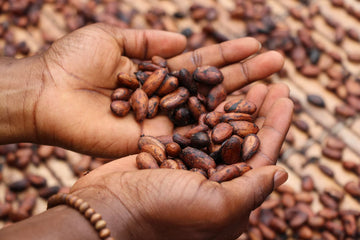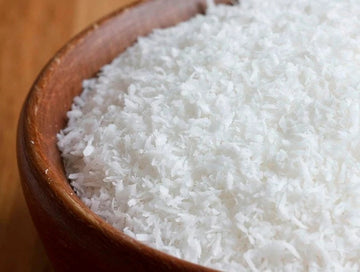
What is Desiccated Coconut

Desiccated coconut is obtained through a process similar to shredding but is completely dried out with the moisture removed.
It is made by grating the white, coconut flesh finely, before drying out in hot air at about 55°c. Due to this only a small percentage of the moisture is present and is overall dry to the taste and touch. This gives it a snow white appearance with a fresh, sweetful and nutty flavour.
Desiccated coconut most commonly found in the market is finely grated, but can also be shredded, flaked or powdered.
It is mostly unsweetened, with very little additives besides the added preservative to prolong shelf life.
The distinction between shredded and desiccated coconut is that shredded coconut retains most of its moisture and is grated into larger pieces, hence not easily dried out.
Uses of Desiccated Coconut
Although high in fat, the coconut flesh is filled with a lot of goodness and when part of a healthy diet and active lifestyle, desiccated coconut is beneficial for you.
You can add it to several food and drinks for that extra flavour and it also provides a healthy dose of essential vitamins and minerals.
Dessicated coconut is a common ingredient in several savoury and sweet recipes to give a good flavour and texture and can be added as a topping or texture to your already nutritionally packed meals or drinks.
You can add it to your favourite cereal and baked goods such as cookies, cakes, and pastries. It can also be used in smoothies and shakes, sprinkled on salads and stirred in vegetables.
You should try to replace any synthetic sweeteners and unhealthy snacks in your diet with desiccated coconut. This allows you to enjoy something sweet but nutritious instead of the usual empty calories and damaging excess sugar.
Nutritional Content
For 100 grams of pure desiccated coconut, here are the approximate nutritional values:
- 605 calories
- 5.6g of protein
- 6.1g of carbohydrates
- 62g of fats
- 6.1g of natural sugars
- 21.1g of fibre
- 90% of the adult RDI (recommended daily intake) of manganese
- 55% of the adult RDI of copper
- 22% of the adult RDI of selenium
- 23% of the adult RDI of phosphorus
- 26% of the adult RDI of iron
- 9% of the adult RDI of zinc
- 33% of the adult RDI of potassium.
Health Benefits of Desiccated Coconut
Even with the word “nut” in its name, coconuts are actually the fruit of the coconut palm plant known as Cocos Nucifera.
This makes this delicious tropical fruit high in natural sugars, and when you understand its health benefits, you’ll be looking forward to including it in your daily diet.
High in Dietary Fibre for Fat Loss
Dietary fibre is plant material which is never properly digested by our bodies. As it mixes with fluids and goes through our stomach and intestines, fibre turns into a gel-like substance which sticks to the stomach lining.
This slows down our metabolism by slowly releasing the food into the stomach than normally therefore promoting satiety and keeping you feeling fuller for longer.
Fibre intake is proven to reduce risk of developing ‘visceral body fat’, which makes losing excess fat in this region far easier.
Having a good amount of fibre in our body is shown to help diversify gut bacteria which is linked to a lower risk of type 2 diabetes and heart disease.
Rich in Iron to Prevent Anaemia
Coconuts are surprisingly a good source of iron, which is most commonly found in red meat, liver and beans.
Iron is used to carry oxygen in the red blood cells which travels around the body.
If sufficient iron is not consumed, anaemia can develop due to red blood cell deficiency.
This can cause pale skin, extreme fatigue and dizziness, shortness of breath and heart palpitations.
To avoid anaemia, you should aim to eat a balanced diet rich in iron and try to meet your RDI (Recommended Daily Intake).
This can be conveniently done by adding desiccated coconut to your meals and is an easy way to boost your iron levels.
Helps in Preventing Osteoporosis & Arthritis
Fatty acids in coconut have been proven to help strengthen the bones and prevent their degradation. This is the reason why coconut oil is now regularly used as a treatment for those with osteoporosis.
The antioxidant properties of coconut make it both an anti-inflammatory and an analgesic.
Arthritis is known to cause inflammation and pain in the joint, but the consumption of desiccated coconut (or other coconut products) can help soothe the symptoms.
Great Source of many Minerals which aren’t always Easy to Consume
Desiccated coconut is rich in both manganese and copper, which aren’t present in high quantities in other foods.
Manganese is essential for general bone health, as well as for the metabolism of protein, carbohydrates and cholesterol and is also known to lower the risk of diabetes.
Copper is another important mineral known for its capability to treat several chronic medical conditions including Alzheimer’s and Parkinson’s disease.
How to make Home-made Desiccated Coconut
Here is a simple, step-by-step process of how you can make desiccated coconut at home.
- Break the coconut and use half of the coconut. Remove them from the shell as pieces.
- Remove the outer dark skin from the coconut as only the white part of coconut is used for making desiccated coconut.
- Transfer the contents to a mixer/grinder.
- Grind the coconut into fine granules/flakes.
- Transfer the grated coconut to a Pan/Karahi and Dry roast the coconut in low flame without browning.
- Saute till the stickiness and moisture is completely removed. It will take between 10-15 minutes.
- Once it cools down, store it in an airtight container.


